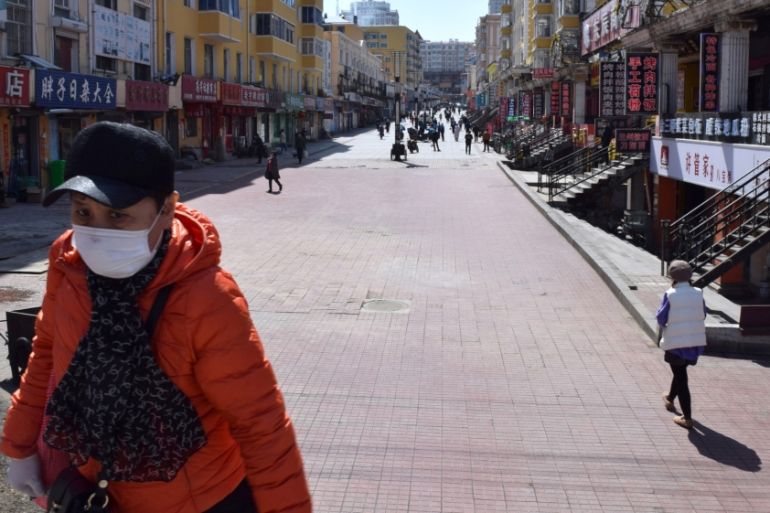China’s economy dragged into historic slump due to coronavirus
GDP declined more than analysts expected as retail sales slumped in March, but factory activity signals recovery.

China‘s economy shrank for the first time since at least 1992 in the first quarter, as the coronavirus outbreak paralysed production and spending, raising pressure on authorities to do more to stop mounting job losses.
Gross domestic product (GDP) fell 6.8 percent in January-March year-on-year, official data showed on Friday, larger than the 6.5-percent decline forecast by analysts in a Reuters news agency poll and reversing a 6 percent expansion in the fourth quarter of last year.
Keep reading
list of 3 itemsChina failed to warn public of coronavirus threat for days: AP
COVID-19: China approves testing of three experimental vaccines
The contraction is also the first in the world’s second-largest economy since at least 1992 when official quarterly GDP records started.
On a quarter-on-quarter basis, GDP fell 9.8 percent in the first three months of the year, the National Bureau of Statistics said, just off expectations for a 9.9 percent contraction and compared with 1.5 percent growth in the previous quarter.
While China has managed to get large parts of its economy up and running from a standstill in February, analysts say policymakers face an uphill battle to revive growth as the coronavirus pandemic ravages global demand.
“The March data add to broader signs that China’s economy is past the worst. But the recovery will probably continue to underwhelm,” said Julian Evans-Pritchard, senior China economist at Capital Economics in a note to clients seen by Al Jazeera.
“One problem is that domestic demand is being held back by labour market strains: the unemployment rate remained elevated in March, and per capita incomes declined outright in Q1,” he said.
China‘s urban jobless rate was at 5.9 percent in March, down from 6.2 percent in February.
The high level of unemployment is likely to have a continued effect on private spending and investment, Pauline Loong, managing director of research consultancy Asia-Analytica told Al Jazeera.
“As long as people feel that this virus is going to continue or that hasn’t been contained, there is very little in the way of stimulus that the government can do. People are not investing, (not) because they don’t have money but because they don’t have confidence,” she said.
Data released on Friday also showed that China’s retail sales fell by 15.8 percent in March, worse than an expected 10 percent decline according to a Reuters poll. Although strict travel restrictions were relaxed, consumers continued to shun crowded spaces and practised social distancing.
However, industrial output was down by a less-than-expected 1.1 percent in March from a year earlier, signalling that factory activity was restarting faster than initially expected.
“The lights are turning back on, people are working … so end consumption will recover,” Stephen Innes, Asia Pacific market strategist at AxiCorp told Al Jazeera.
Fixed-asset investment shrank 16.1 percent in January-March, giving markets reason to anticipate more fiscal and monetary support from policymakers, Innes added.
As such, stock markets in China climbed despite the dismal GDP data. The Shanghai Composite Index gained 0.89 percent on Friday morning while the blue-chip benchmark CSI 300 rose 1.23 percent.
The pandemic has infected more than two million people globally and killed more than 130,000. China, where the virus first emerged, has reported more than 3,000 deaths although new infections have dropped significantly from their peak.
Still, officials are worried about a possible second wave of infections and analysts warn it could take months before the economy recovers to normal levels.
Analysts expect nearly 30 million job losses this year due to stuttering work resumptions and plunging global demand, outpacing the 20-plus million layoffs during the 2008-09 financial crisis.
Beijing has pledged to take more steps to combat the effect of the pandemic, as mounting job losses threaten social stability.
The central bank has already loosened monetary policy to help free up the flow of credit to the economy, but its easing so far has been more measured than during the global financial crisis.
The government will also lean on fiscal stimulus to spur infrastructure investment and consumption, which could push the 2020 budget deficit to a record high.
For 2020, China‘s economic growth is set to stumble to its slowest annual pace in nearly half a century, a Reuters poll showed this week.
The property market, a key growth driver, was another sector affected by the pandemic as property sales by floor area fell 26.3 percent from a year earlier in the first three months of 2020, according to official data.